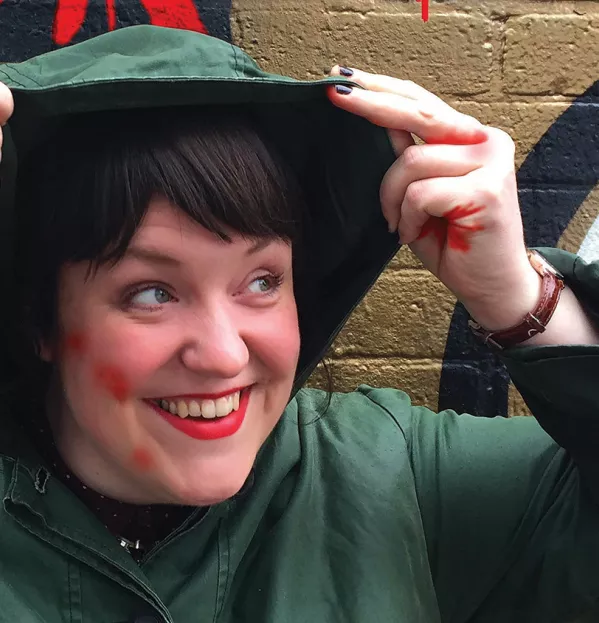Art imitates classroom life at Edinburgh festival

The state of teaching is so parlous, Jo D’Arcy (pictured) says, that quitting the profession to become a stand-up comedian felt like a sensible career choice.
“It cost me a fortune to train as a teacher,” D’Arcy, who now couples supply work at a Staffordshire secondary with the stand-up circuit, says. “But it was so stressful that I left. Now I go up and down the country, playing to working-men’s clubs. But that’s a better option. What does that say?”
D’Arcy’s one-woman show, D’Arcehole, is one of a number of school-related shows that are being performed at the Edinburgh Festival Fringe this year.
Her performance invites the audience into an ersatz classroom. “I wanted people to see what a lesson’s like when it’s taught by someone who’s got more energy, because they’re not a full-time teacher,” she says.
D’Arcy is somewhat unorthodox in her teaching methods, in art as in real life.
“I can’t stand detentions,” she says. “All you’re doing is giving up your lunch to spend time with someone you don’t enjoy teaching anyway.
“So I just go for a nipple tweak, and they don’t do it again. I find it an effective behaviour-management strategy.”
State of the nation
This year, a considerable number of shows at the festival - D’Arcehole among them - offer commentary on the state of the contemporary education system.
Education, Education, Education tells the story of a staffroom in 1997, the week after the election brought Labour back to power in a dramatic landslide.
“As the play starts, they’re super-excited about the Labour win,” says Hannah Smith, the show’s producer. “Labour has promised so much money to the education system. Imagine what that must have been like as a teacher. You’re like, ‘Oh, my God. We’re going to have the greatest time ever.’
“So we’re drawing parallels with the education system today. Obviously, the money isn’t there any more. Schools don’t have money to buy books or pens. What’s going to happen to the education system now?”
The show’s pitch was initially a 1990s version of Animal Farm, but with teachers in place of animals. Though the format has now changed, the original aim - to use the staffroom as a metaphor for the country as a whole - remains.
“It’s easy to make the leap from school to nation,” Smith says. “People make decisions in a school, and those decisions affect your entire student body. And there are so many different races and different incomes in a school.
“We’re looking at: what do you want the leader of your school to be like? What do you want the leader of your country to be like? As a student - or as a citizen - what are your responsibilities? It’s very easy to use school when you want to refer to something bigger.”
The Staff Room, too, looks at how politics play out in school. Written and directed by dance teacher Michelle Payne, the play illustrates - through a series of teacher characters - the ways in which the government can make life harder for teachers.
“This is a really hard job,” Payne says. “You have to be a role model as well as a good teacher, because students are so impressionable, and you want to make a difference.
“I wanted to do something that said to teachers, ‘We appreciate everything you do. And do you actually get a life, alongside the pressure and responsibility of teaching the next generation?’”
Exposing risks
For Ashley Fenton, head of drama at Guildford High School in Surrey, getting a life involves taking a cast of 11 pupils to Edinburgh for 10 days.
The group’s play, Girls Like That, also brings contemporary life to the stage: it shows teenage girls turning on one of their own, after she sends explicit photos to her boyfriend. “Some girls in the play are quite brutal, unpleasant, merciless,” Fenton says. “Others, their conscience starts to speak to them, but they’re not strong enough.
“The play doesn’t present girls in a particularly positive light at all.
“Sexting, it’s relevant in every school in the country. It’s very much an issue for our pupils’ generation. Drama should be a reflection of society.”
The Guildford High actors have been allocated a 110-seater venue. But Fenton is not concerned about playing to half-empty houses - in part, she says, because it is not her problem. “The girls work incredibly hard up there,” she says. “It isn’t a holiday. It isn’t lay-in-bed-until-midday. We have a schedule. We go to press functions. We go flyering. It’s hard graft. That’s how you get audiences.”
But, she adds, this is a valuable lesson that - as many performing teachers recognise - will prepare pupils for the harsh realities of life.
“When students perform drama, very often those audiences are made up of people who are benevolent well-wishers,” she says. “But going out to the general public, you may get a bad review.
“Not everything in life is going to be all for you. There are going to be knocks along the way - things that don’t quite go the way you want them to.
“That’s a pretty important lesson.”
You need a Tes subscription to read this article
Subscribe now to read this article and get other subscriber-only content:
- Unlimited access to all Tes magazine content
- Exclusive subscriber-only stories
- Award-winning email newsletters
Already a subscriber? Log in
You need a subscription to read this article
Subscribe now to read this article and get other subscriber-only content, including:
- Unlimited access to all Tes magazine content
- Exclusive subscriber-only stories
- Award-winning email newsletters